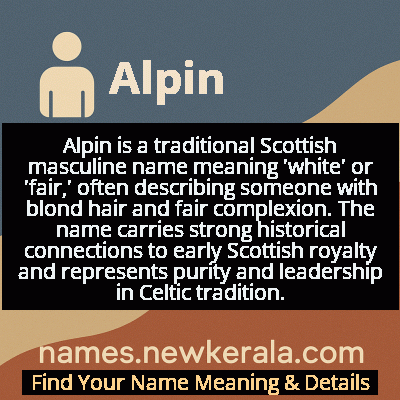Alpin Name Meaning & Details
Origin, Popularity, Numerology Analysis & Name Meaning of Alpin
Discover the origin, meaning, and cultural significance of the name ALPIN. Delve into its historical roots and explore the lasting impact it has had on communities and traditions.
Name
Alpin
Gender
Male
Origin
Scottish
Lucky Number
7
Meaning of the Name - Alpin
Alpin is a traditional Scottish masculine name meaning 'white' or 'fair,' often describing someone with blond hair and fair complexion. The name carries strong historical connections to early Scottish royalty and represents purity and leadership in Celtic tradition.
Alpin - Complete Numerology Analysis
Your Numerology Number
Based on Pythagorean Numerology System
Ruling Planet
Neptune (Ketu)
Positive Nature
Intuitive, analytical, spiritual, and inquisitive.
Negative Traits
Secretive, reserved, aloof, and can be overly critical.
Lucky Colours
Green, yellow.
Lucky Days
Monday.
Lucky Stones
Cat’s eye, moonstone.
Harmony Numbers
1, 5, 6.
Best Suited Professions
Scientists, researchers, spiritual leaders, detectives.
What People Like About You
Depth of knowledge, analytical skills, spirituality.
Famous People Named Alpin
Alpín mac Echdach
Scottish King
Father of Kenneth MacAlpin and ancestor of Scottish royal dynasty
Alpin Grant
Clan Chief
Influential 19th century chief of Clan Grant in Scottish Highlands
Alpin MacTavish
Military Commander
Jacobite leader during the 1745 uprising against British rule
Name Variations & International Equivalents
Click on blue names to explore their detailed meanings. Gray names with will be available soon.
Cultural & Historical Significance
In Highland culture particularly, the name Alpin symbolizes Gaelic heritage and resistance to cultural assimilation. During periods of English domination and the Highland Clearances, names like Alpin served as markers of cultural preservation and historical continuity. The name appears in numerous clan histories, including the Grants, MacGregors, and other families who claimed descent from the ancient royal line. In modern Scottish cultural revival movements, Alpin has been reclaimed as a symbol of authentic Gaelic identity and historical consciousness, representing both the ancient roots and enduring spirit of Scottish culture.
Extended Personality Analysis
Individuals named Alpin typically exhibit a strong sense of identity rooted in tradition and heritage. They often possess natural leadership qualities combined with a thoughtful, strategic approach to problem-solving. This combination makes them effective in positions of authority while maintaining the respect of their peers. Their connection to the name's royal history often manifests as a sense of responsibility and commitment to community and family values. Alpins are frequently described as principled individuals who value honesty and fairness, reflecting the symbolic 'purity' associated with their name's meaning.
Beyond their leadership capabilities, Alpins tend to be deeply connected to their cultural roots and family history. They often show interest in genealogy, historical preservation, and cultural traditions. This historical consciousness gives them a unique perspective that balances respect for the past with practical engagement in the present. They typically demonstrate resilience and adaptability, qualities that served their namesake ancestors well through Scotland's turbulent history. While they may appear reserved initially, Alpins often reveal warmth and loyalty in personal relationships, valuing deep connections over superficial social networks.
Modern Usage & Popularity
In contemporary naming practices, Alpin remains a distinctive choice that reflects both Scottish heritage and a preference for traditional names with historical depth. While it has never reached mainstream popularity, it maintains consistent usage particularly in Scotland and among Scottish diaspora communities in North America, Australia, and New Zealand. The name has seen a modest increase in usage since the 1990s, coinciding with the Scottish devolution movement and renewed interest in Celtic cultural identity. Modern parents choosing Alpin often do so consciously to honor family heritage or Scottish ancestry rather than following current naming trends. The name's rarity adds to its appeal for those seeking a unique but historically grounded name. It appears more frequently in Scotland's Highlands and Islands regions where Gaelic language and culture have experienced significant revival, making it both a personal identifier and a statement of cultural affiliation.
Symbolic & Spiritual Meanings
Symbolically, Alpin represents the intersection of personal identity and cultural heritage, embodying concepts of purity, leadership, and historical continuity. The core meaning of 'white' or 'fair' extends metaphorically to represent clarity of purpose, moral integrity, and spiritual enlightenment in Celtic tradition. As the name of Scotland's foundational royal dynasty, it symbolizes legitimate authority, the weight of history, and the responsibility that comes with leadership. The name also carries symbolic meaning related to cultural preservation and resistance, reflecting Scotland's long struggle to maintain its distinct identity. In a broader sense, Alpin represents the idea that individual identity is deeply connected to collective history and that personal character is shaped by ancestral legacy. The symbolic resonance makes it a name that speaks to both individual qualities and cultural values.

